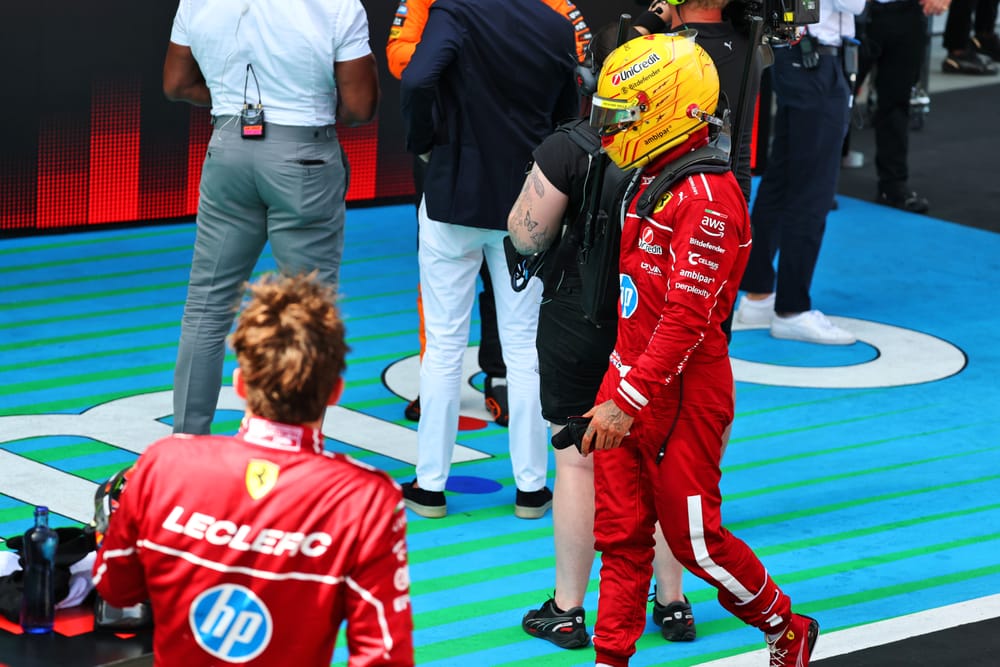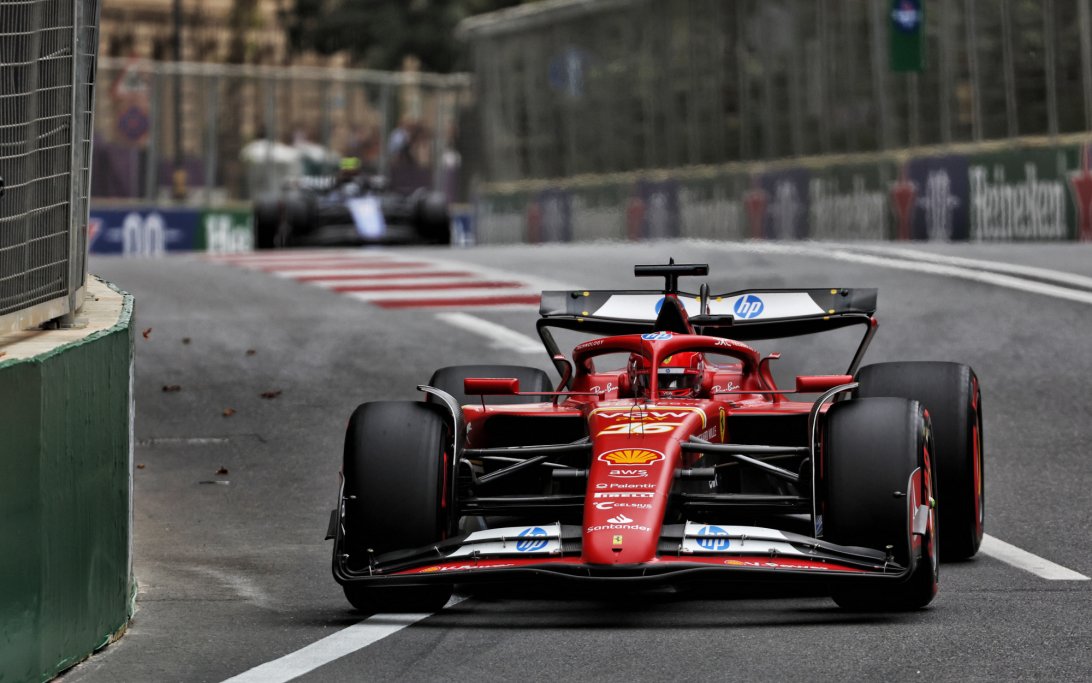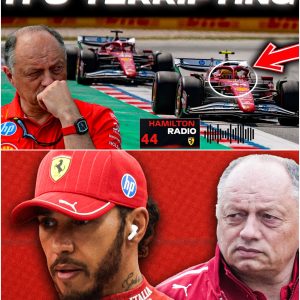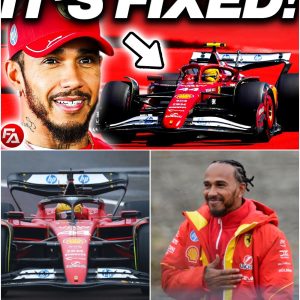The Azerbaijan Grand Prix has once again thrust the Ferrari team into the center of unending controversy, but this time, the intensity feels magnified.
Lewis Hamilton, an icon of professionalism and composure, could not contain his rage over the team radio after receiving “bizarre” strategic instructions that completely upended his race plan.
The moment not only sent shockwaves through the fanbase but also caused the international media to immediately zero in on Ferrari, which finds itself mired in crisis yet again.
Is this a turning point in the relationship between Hamilton and the team, or merely the beginning of a much larger internal meltdown at Maranello?

Baku, once again, set the stage for a dramatic Formula 1 spectacle. This time, however, it wasn’t a classic strategic blunder or pit stop drama, but a moment that could very well dictate the entire direction of the Ferrari project with Lewis Hamilton at the helm. In a race that should have been a straightforward opportunity to score points without podium expectations, Ferrari left Azerbaijan with far more questions than answers.
Hamilton arrived in Baku with renewed enthusiasm. Friday’s FP2 session showed a promising performance; the pace of the SF-25 was even better than last season’s pole-setting car. All signs pointed to one conclusion: Ferrari had a package competitive enough to secure a starting position on at least the third row. However, a critical decision by Ferrari in Q2 marked the beginning of a nightmare. Instead of opting for the medium tire, which data showed offered stability and consistent performance, the team sent Hamilton out on the soft compound. It was a high-risk gamble, and it failed spectacularly.
Telemetry data recorded significant rear instability in Hamilton’s SF-25, forcing him to make micro-corrections in turns 3 and 7. The result was a Q2 elimination and a disappointing 12th-place start, while his rivals on the medium tire set clean, competitive laps. For Hamilton, this was more than just a loss of grid position; it was a breach of trust. “I was really disappointed with the car after FP2,” he stated, his frustration palpable.

The race in Baku was a true mental test for Ferrari. From the very beginning, Hamilton had to work exceptionally hard to navigate the notoriously difficult-to-overtake street circuit. Baku demands not only speed but also courage and strategic precision, as every minor mistake can have devastating consequences. Hamilton fought valiantly lap after lap, exploiting every possible gap, and ultimately secured eighth place at the finish line.
However, the climax of the drama occurred in the race’s final moments: a radio instruction to yield his position to teammate Charles Leclerc came far too late. The call was made at the most crucial juncture, on the final lap, when the gap between the two Ferrari drivers was already minimal. Hamilton briefly lifted off the accelerator on the final straight to comply with team orders, but the finish line arrived sooner than anticipated. A mere 0.4 seconds separated success from failure. The swap failed, and Ferrari lost two critical points that could have kept them ahead of Red Bull in the Constructors’ Championship.
Leclerc’s frustration was evident in Parc Fermé. He simply shook his head in disappointment, his eyes vacant as if he couldn’t believe what had just transpired. He then removed his gloves with a quick, emotional gesture. Hamilton, on the other hand, had a far more explosive reaction. In a high-pitched voice, barely concealing his anger, he firmly declared, “This is terrible and it won’t happen again.” The statement was brief but powerful enough to ignite the paddock. Team crews, journalists, and even rivals fell silent for a moment, realizing that Ferrari was now in the eye of a storm, ready to erupt at any moment.
The late radio call wasn’t the only point of scrutiny. Data revealed that Ferrari had numerous earlier opportunities to issue the instruction. The delay pointed to a structural problem—a lag in decision-making that should never occur in a team aspiring to win championships. This isn’t just an operational issue; it’s a philosophical one. Hamilton comes from Mercedes, a team that built its eight-year dynasty on precise execution. There, team orders were rarely questioned because they were always delivered promptly and clearly. At Ferrari, however, Hamilton was forced to improvise on the final lap, not for a win, not even for a podium, but merely to fight for eighth place.

Riccardo Adami, Lewis Hamilton’s engineer, finally addressed the incident in a post-race interview. Adami admitted that the delayed radio call was a team error that should not have happened. “We were really late. We had several opportunities to give instructions earlier, but we were too focused on monitoring the gap to the car ahead and managing tire temperatures,” he explained. “Lewis was furious on the radio after crossing the finish line, although he didn’t show it on camera. I think it’s understandable that he was angry. He gave it his all on the medium tires, passing three cars at the end of the stint, and we failed to execute the simplest part of the plan.”
The situation is further complicated by the fact that Ferrari now has two leaders on the track: Leclerc, the team’s icon who has been a mainstay for six years, and Hamilton, the seven-time world champion brought in to lead a new era. Without a clear hierarchy, any miscommunication is perceived as an injustice. This pressure is exacerbated by public and media expectations, which constantly question the team’s priorities. Behind the scenes, Ferrari’s engineers and management must work overtime to maintain balance, because the slightest misstep could trigger an internal conflict that would shatter the team’s harmony for the rest of the season.
The final result in Baku might seem trivial on paper—P8 for Hamilton and P9 for Leclerc. However, the implications are far greater than just the points on the standings. Ferrari now holds a narrow lead over Red Bull in the Constructors’ Championship, a lead that could vanish in a single bad weekend. The two points lost in Baku may seem insignificant today, but they could mean the difference between third and fourth place by the end of the season—a result that will influence the development direction of next year’s car.
This outcome further damages Hamilton’s chances of competing for the world championship. He now trails Oscar Piastri by 203 points and George Russell by 91, deficits that will be nearly impossible to overcome unless Ferrari quickly finds consistency. The pressure is mounting as his former team, Mercedes, continues to consistently collect points and establish themselves as McLaren’s main challenger. If this trend continues, Ferrari could miss out on a podium finish in the Constructors’ Championship and a golden opportunity to prove that hiring Hamilton was the right move to lead the team into a new era.
More significantly than the race results, Baku exposed the gap between Hamilton’s expectations and Ferrari’s operational approach. Tire issues in qualifying, late radio calls, and an unpredictable car have all created a subtle but noticeable erosion of trust. Hamilton wasn’t shouting over the radio as he might have in the past; nor did he publicly blame the team. However, his body language, tone of voice, and terse statements were enough to put Ferrari on high alert. A world champion doesn’t need to yell to express his profound frustration.
Ferrari has reportedly developed a significant upgrade package for Monza, focusing on rear stability and weight redistribution to improve the car’s handling under braking. However, with Red Bull just 14 points behind, time is running out. If they fail to correct the project’s direction, they won’t just lose ground in the championship; they will risk losing Hamilton’s trust—not contractually, but mentally. When a champion starts driving without faith in his team, his performance will inevitably suffer, not because of a loss of speed, but because of a loss of motivation. Can Ferrari maintain team unity, or will we witness a major internal crisis by the end of the season? Leave your thoughts below.





